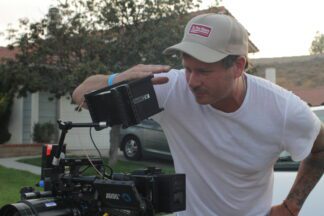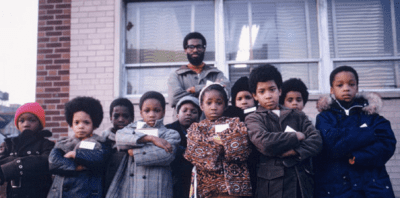A still from 'Monsters of California'
Star Man: A conversation with Blink-182’s Tom DeLonge
DeLonge, back on the road with Blink-182, has released a movie about aliens; 'Monsters of California' is out now
Pop punk icon and UFO researcher Tom DeLong is adding a new line to his bio: film director. The Blink-182 guitarist has emerged as an unexpected voice in the Capitol Hill conversation around unidentified anomalous phenomena (or UAP, which has replaced UFO as the preferred nomenclature). Now he’s made a movie to try to get his message out there.
DeLonge quit Blink-182 (for the second time) and in 2017 was part of a team of 12 people who formed To the Stars Academy of Arts & Sciences, an entertainment company that works with current and ex-government officials to disseminate information about UAPs: To the Stars provided the New York Times with naval footage of flying objects that had no visible engines or exhausts and reached 30,000 feet at hypersonic speeds.
Now through To the Stars, the rocker is releasing his directorial debut, “Monsters of California,” fusing fiction, research and DeLonge’s own childhood in California. The result is not exactly a cinematic masterpiece, but the movie gives him another platform to discuss his favorite topic.
The movie follows high schooler Dallas Edwards (Jack Samson), an armchair conspiracy-theorist-turned-gumshoe who discovers a missing government agent’s intergalactic research. Evidence in hand, Dallas and a few fellow misfits embark on a dangerous adventure to uncover a paranormal conspiracy in Southern California. Add some undertones about the afterlife and a visit from Bigfoot, and you have “Monsters of California.”
On the occasion of the movie’s release, Brooklyn Magazine called DeLonge, who was in Portugal for Blink-182’s sold-out reunion tour (he rejoined in 2022), to talk all things Blink and UAPs.

DeLonge behind the camera
How has it been since coming back to Blink-182 last year?
It’s crazy. We got this band back together just as friends again. Mark [Hoppus, the bassist,] was going through a very difficult time with his cancer treatments and no one really expected the band to be in this position: It’s like we’re bigger than we’ve ever been. Our running joke is to keep breaking up because it’s working to our benefit. But it’s just been a whirlwind, man. Our shows across the world sold out in 48 hours, and here I am a year later in Portugal still playing them. I don’t know why I get to be in a position where people still care about my art, but I’m so thankful and I’m just gonna ride it as long as people care.
Tell me about making Blink’s new album “One More Time…” after not making music with Travis Barker and Mark for almost a decade.
The album has such a great blend of the old current and who we are moving forward. There’s a lot of nostalgic moments and there’s a lot of more progressive moments. I think we really found a way to come together. Everyone’s communicating and gelling better than we ever have. All the little kid ego stuff is largely out of the window. We’re all just so thankful to be here. No one wants to fuck it up, you know?
What inspired you to make “Monsters of California”?
Before I got back together with Blink, I started a production company, To the Stars, and I want to start telling stories with books and novels. Some of those things are already happening and some are coming soon, but this was the first feature that I wanted to do. It’s really autobiographical about the tribe of skateboarders that I grew up with.
I really want to inspire wonder and get people talking about the paranormal and UFOs because all that’s starting to come out from the government will be really big over the next five to 10 years. It’s going to change the world, so I really want to get people started in the right direction so they can talk about these things and have an understanding of what’s been going on.
How did your interest in aliens become more than a hobby?
Once I started touring with Blink, I started doing deep dives into books about it. We were in the van for 10 months out of the year, driving from state to state and in different countries, so you always need a decent book to read, or else you’re just bored out of your mind.
The more I got into it, the more I realized not only how real this is but how complicated it is. But I also knew that nobody took it seriously, really, so it became a running joke with the guys in the band that I was nuts for believing in the stuff. It’s so fascinating that it has overtaken anything else as a hobby for me.
Why are some of the best stories about aliens, like “E.T.,” often about loss and the afterlife?
Paranormal just means more than normal right now, but once it’s normalized, we’re going to realize that science and quantum physics make one unified theory of how the universe works. We’re going to realize that it all comes down to what a human is and the things about being a human being — love, loss, pain and fear — are extraordinarily powerful and important. The human experience is something to be celebrated and nourished. I’ve always thought that feature films were a great way to express that because you can capture emotion and a whole lot of information in one little spurt of energy.
What does your research tell us about the human experience?
Anything we never understood or couldn’t measure in science, we would just throw it off to religion or spirituality. We said, “Here’s all this woo-woo stuff so we’ll just throw it in religious texts.” We’re at the point now where we can measure attributes of consciousness and quantum physics describes that we’re transducers of our environments. Physical reality is created through our thoughts, and we never knew this before. If we don’t take control of our thoughts, then something else will come here and take us off the rails for their own benefit. That’s really where the UFO subject becomes unnerving and fascinating all in the same breath.
Did a lot of your UAP research inform the story for “Monsters of California,” or did you make some stuff up?
Anything to do with the UFO subject in the movie is very serious and thoughtful. The stories of the kids are largely fictionalized, other than the way they talk and the way they joke. The tone of who they are is very autobiographical. Even the ending of the movie is very autobiographical with the kids getting videos out to the news, because the people at To the Stars and I are the ones who took the videos of the pilots and the UFOs to the New York Times.
Why did you tell a fictionalized version of the story as opposed to a documentary?
Tying the subjects of UFOs into my own autobiographical neighborhood and tribe is something I did because I thought it would really be a great introductory point into the subject of consciousness itself. People think that UFOs are all about spaceships and people coming from other planets or something. It’s not. It’s way more complex than that and you can’t just hit everybody over the head with these huge quantum physics lessons at first. It’s really to get people interested and start asking questions.
If there’s compelling evidence that we’re not alone in the universe, how can we know if it’s benevolent or malevolent?
I think it’s hard for people to understand that time is not linear, it’s parallel. Everything that can happen is happening all at the same moment. So things that are at the end of their technological cycle have the ability to traverse into our reality, where we’re at the beginning of our technological cycle. Time moves in a multitude of ways, and I think that’s where people will start to lose it if you hit them over the head too quickly with things like UAPs coming from Mars. Because, no, that’s not exactly how it works. I think we’re in for it over the next few years, but it’s going to be a fun ride.
Why do you think Tucker Carlson is the most receptive news figure to your UAP research?
I don’t really know. I mean, I can see why all the conspiracy theorists, people that are ultra-religious, and the crazy right wing are jumping on things quicker. They’re always looking for that “aha” moment about the deep state. I can also see all the left-wing academics at the universities and think tanks who say they need more evidence and won’t subscribe to something so big without evidence. So, I see both sides holding on to what they need for their worldview. But to me, it doesn’t even matter at all. It’s real. It’s coming out, and people better start treating this seriously and with an open heart because it’s going to change the world. It already is.
What’s going to change? How we understand being human?
Yeah, it’s going to be our understanding of reality, of consciousness, who we are, of time, of religious events, the paranormal, and what it is. The way that quantum physics works and the way that we navigate reality within that framework. I think that when all those things start firing, it’s going to make us look at ourselves as mankind living in perpetual states of war. It highlights why it’s so important to change the way you think and the way you feel on a daily basis because reality is formed from it. We’re not reacting to reality. We’re literally creating reality. That’s going to be a mind fuck for a lot of people, especially people who have clung on to very specific belief systems about the creation of the universe. It all goes out the window, all of it.
You might also like 


























